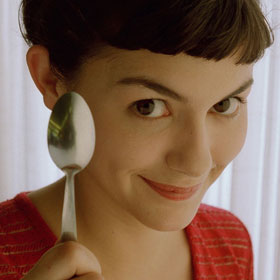Amelie

5/5
While America is the land of the blockbuster, the tent pole, and the box-office shattering franchise (Hi, Harry!), Europe, and in particular France, is home to the art film, brooding, moody, and ultra-serious. Put simply, Hollywood makes movies and Europe makes films and never the twain shall meet. Yet for one glorious moment in the winter of 2001, a dazzling light and warmth burst forth from France and enchanted a world reeking with disillusionment and still nursing the open wounds of 9/11.
A dazzling, dizzying, modern-day fairytale set amongst a vibrant and colorful Parisian neighborhood, Amelie was, and still is, a tall glass of pure sunshine. Bright, beautiful, and at times so light you have to weight it down to keep it from floating away, the film threatened a new commercial viability for French cinema (which sadly never materialized) and offered redemption for a director who was then best known internationally for helping to sink the Alien franchise.
Set in a Paris a million miles away from the race-fuelled powder keg of co-lead’s Mathieu Kassovitz’s own international success, La Haine, Jeanut orchestrates a whimsical coming-of-age romance, anchored around Audrey Tatou’s eponymous café waitress and her singularly skewed view of the world. A breakout, pitch-perfect performance from its star, Tatou’s Amelie is an impish, karmic good fairy who takes it upon herself to arbitrarily brighten the lives of her co-workers and regular customers – another of Jeunet’s indelible bands of lonely misfits – who frequent their establishment via a wave of well-intentioned mischief-making that will life the heaviest if spirits.
Freed from the perennially dark and gothic visions of longtime collaborator, comic book artist Marc Caro, Jeunet imbued the picture with such a vivacious love of life as to be positively irresistible. As always the colorfully quirky characters accent the humdrum locale, glaringly free of the trademark steampunk signatures for the first time in his career. That said, however, one of the few indulgences the director does permit himself finds him utilizing everything in a room that moves, squeaks, clunks, or sputters in service to one of the most memorable sex scenes you’ll ever see, and one that will leave viewers howling.
At the time of the film’s initial release, those who simply had to find fault zeroed in on a notable lack of ethnic diversity on display, accusing the director of whitewashing Paris. Such claims were nonsense at the time and remain nonsense now – the mere presence of Kassovitz discounts the notion almost entirely. Besides, this is Amelie’s story, her innocent, wildly impulsive endeavors the window to an imagination through which Jeunet is afforded the opportunity to paint an astonishingly optimistic portrait of innate human kindness, and in the process deliver one of the single most enjoyable films you’ll ever see.
RELATED ARTICLES
Get the most-revealing celebrity conversations with the uInterview podcast!







Leave a comment